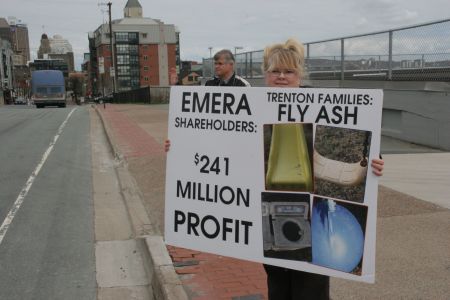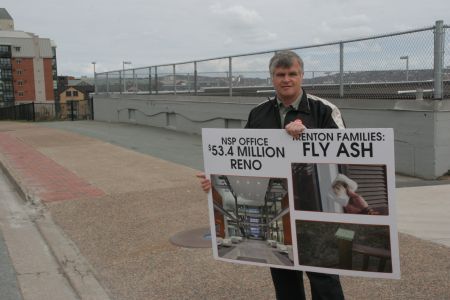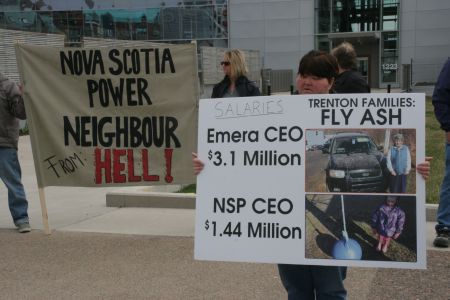K'jipuktuk (Halifax) - Peter Boyles and the Nova Scotians who make their homes in the shadows of Nova Scotia Power's Trenton Generating Station have a different relationship with electrical power than most. According to the National Pollutant Release Inventory, in 2010 the Trenton station, which continues to generate 310 MW of electricity by burning coal, emitted 38 kilograms of arsenic, 16 kilograms of lead, 19 kilograms of mercury, and 19,257 tonnes of sulphur dioxide into the air. Under the Greenhouse Gas Emissions Reporting Program, in 2010 Trenton spewed out 1,700,548 tonnes of carbon dioxide, 16.4% of Nova Scotia's total.
While many Nova Scotians have a general idea that burning coal is an antiquated and highly polluting form of electrical generation, Boyles says that for him and others the reality of coal fly-ash blow-offs raining down on their properties has meant untold and unmeasured environmental and health effects. Population estimates for the county of Pictou also project a downward slide.
Boyles, however, is resilient in his determination to fight off Nova Scotia Power and stake his ground.
I caught up with Peter Boyles and some associates from the Trenton-Hillside Environmental Watch Association outside of the Nova Scotia Power headquarters in Halifax.
Your family has lived down Boyles Road for several generations. Can you describe what the area was like before the coal plant was built?
My grandfather first came down here around 1893. He bought a piece of land and then he bought some more, and in 1900 he sort of bought the whole point here that we live on today.
Back then he raised a big family of 14 kids. He had gardens, livestock, chickens, the horses, the pigs, the cows. And then you had your wild berries, your sugar berries, your blueberries, your blackberries, your raspberries. You grew your own rhubarb. I mean everything that could be grown or had, wild or done yourself, was done. Your potatoes, carrots, everything.
And today we can't do that. I mean there's no such thing. You can't even eat the blueberries or blackberries because they're all polluted from the ash from the Nova Scotia Power plant and the arsenic levels in the soil. It's crazy.
What have been the effects of the coal plant on your community, both from an economic and a health perspective?
Economically, there's not a lot of business that comes and wants to set up in Trenton and wants to make it a more vibrant community. We don't even have a grocery store. Everything's pulling out and it just seems that there's less and less and less.
As for the health of the community, there it is. We've got the biggest cancer rate going. We're the cancer capital of Nova Scotia and as you know Nova Scotia's the cancer capital of Canada. Every day you can just turn around and it's somebody new that has cancer or they're dying of cancer or they've died of cancer. Plus other sicknesses, respiratory and heart problems; it all goes along with it.
It's all because of the pollution and Nova Scotia Power is the biggest polluter. They turned around and took away our way of living, as far as being able to enjoy our properties and to be able to go out and sit down and barbecue, do stuff, have a clothesline with clothes on it.
When this ash comes out and lands on stuff, man you could be eating it, and if it's on your clothes and clotheslines it likely ruins them.
Even the forestry, I mean it's killing the trees. It's just a mess.
How often is there a fly-ash blow-off at the Trenton Plant?
If they're truthful to you, they'd have to tell you; it's every night. They have to blow those boilers.
If they don't blow those stacks, the tubing and everything in there would all blow. So they have to blow them every night and clean those stacks. So what they'll usually do is do it at three or four in the morning – out of sight out of mind. And if the wind's going a certain way, that's good for them, because a lot of people don't even know what it is.
Even last night I got a call saying: 'Peter, do you see the big bunch of black shit – they call it - come out of the Nova Scotia Power?' It was just because there was no wind and it was just sitting there, just a great big black cloud over it.
But if you call Nova Scotia Power and tell them this stuff they'll just turn around and tell you, 'Oh, we'll have to check back see if we had a run-off or whatever.'
You've been protesting this actively for years. What has been Nova Scotia Power's reaction to you?
I started this back in '99, when somebody told me what was landing on my home because I didn't even know what it was. At first they sort of tried to work with us. They'd turn around and say: 'We're neighbours, we want to be good neighbours,' and all this stuff.
So they'd come down and do stuff. Like I couldn't really get my lawn to grow because of where the fly-ash was landing. So they put a new lawn in.
My daughter had one of those blow-up figure-eight pools and they came down and gave me a big tarp to put over it. So if ash was in the air it would stop it from going in.
We got it so bad here one time, everything needed cleaning off and we had to stay home – we were going away – and we had to stay and clean everything, so they paid for a trip.
At different places around here they'd try and do different stuff, like they paid some people not to eat their raspberry crop. They've given people washers to wash their houses down – the spray systems. They did a lot at first.
Then, when we turned around and decided 'Listen, enough's enough,' and we went after them and put a group together, now they just say 'Unless you can really prove it's coming from us we're not doing nothing to you.'
What's been the reaction of the current NDP government on your protest?
What makes you a little mad is that Charlie Parker is the Minister of Energy. When we first started a group eight years ago, Charlie Parker was the first man to turn around and be there. He was there ahead of us at Nova Scotia Power. This was when he was the opposition. He was really saying 'Why do these people have to put up with this? People shouldn't have to live like this.'
Now he's the minister of energy. He keeps telling us that natural gas is coming in, but Nova Scotia Power's not going to take natural gas, so I don't know where's he coming at with that.
You've got Clarrie MacKinnon from Pictou East, where we are, he talks that 'We're going to do this, we're going to do that,' but nothing's ever happened. It's just more or less political talk.
I guess the Conservatives, if they get in power, want to turn around and keep the coal. I guess they're thinking that the coal is the way to go because it's cheaper, so they're sort of agreeable with Nova Scotia Power about that.
To me it's all just one big political ballgame. It doesn't seem to matter much who gets in there, nobody seems to want to take the bull by the horns and say 'OK, let's do the right thing. These people, it's affecting their health, it's shortening their lives, it's causing them not to be able to enjoy their life like a person should.' But they look at it like 'Oh, there's a few jobs there, so we don't want to lose jobs. We don't want to turn around and have power rates go up. We don't want this, we don't want that.'
It's all just been a big farce.
Have you ever thought of just leaving?
No. The worst about it right now is that – and it really, really ticks me off a lot – is that I'll never leave. I figure that anything that's done, you've done to me now. You know what I mean? I've been living with it all my life.
But when I look at my children and grandchildren. Now my daughter just graduated as a dental assistant, and she's saying 'Daddy, this stuff kills you, you know.' So she moved to the Island. And she says 'It's not that I don't want to be home,' but she hears what's going on, she hears what I'm telling other people. My grandchildren live out in Scotsburn, so they're a little bit farther away from it.
But still, tomorrow if something happened to me, all the land that I own would be hers.
But what's it any good to her? She can't grow nothing on it. And to build here with Nova Scotia Power that's going to put all that on her, she's putting her own health and the health of her children if she has some at jeopardy. This is something I can understand where she's coming from.
But as far as I'm concerned, Nova Scotia Power is not going to drive me out. I'll turn around and I'll hold my ground. And if it means going to the next world and hopefully when I land there I can at least hold my head and say 'Well, I tried.'
What would satisfaction look like to you at this point in this fight?
Satisfaction for me would be for Nova Scotia Power to stop burning the coal. There's other ways they can go at it. They've got natural gas. There's enough wind power now being generated to outdo what Trenton is putting into the grid. So they can get that back and yet they're still burning just as much coal.
If the coal was gone, and the stacks were gone, I'd say 'Listen we've accomplished something that we can be mighty proud of.'
I promised one of our members – he died at 54 years old - he blamed a lot of it on Nova Scotia Power because he lived just up the road from me here. I told him we're going to win this fight, and we're going to see them close her, maybe not as far as close the plant because there's other things they can do.
You'd still not be able to do anything with the earth around here for another hundred years. But at least they would be stopped.
Boyles and the Trenton-Hillside Environmental Watch Association are planning a march on May 11th in Trenton. Stay tuned for more details.
![Peter Boyles and the Trenton-Hillside Environment Watch Association outside the Nova Scotia Power headquarters. David and Goliath? [Photo: M. Howe] Peter Boyles and the Trenton-Hillside Environment Watch Association outside the Nova Scotia Power headquarters. David and Goliath? [Photo: M. Howe]](../../sites/mediacoop.ca/files2/mc/imagecache/page450/img_7475.jpg)





